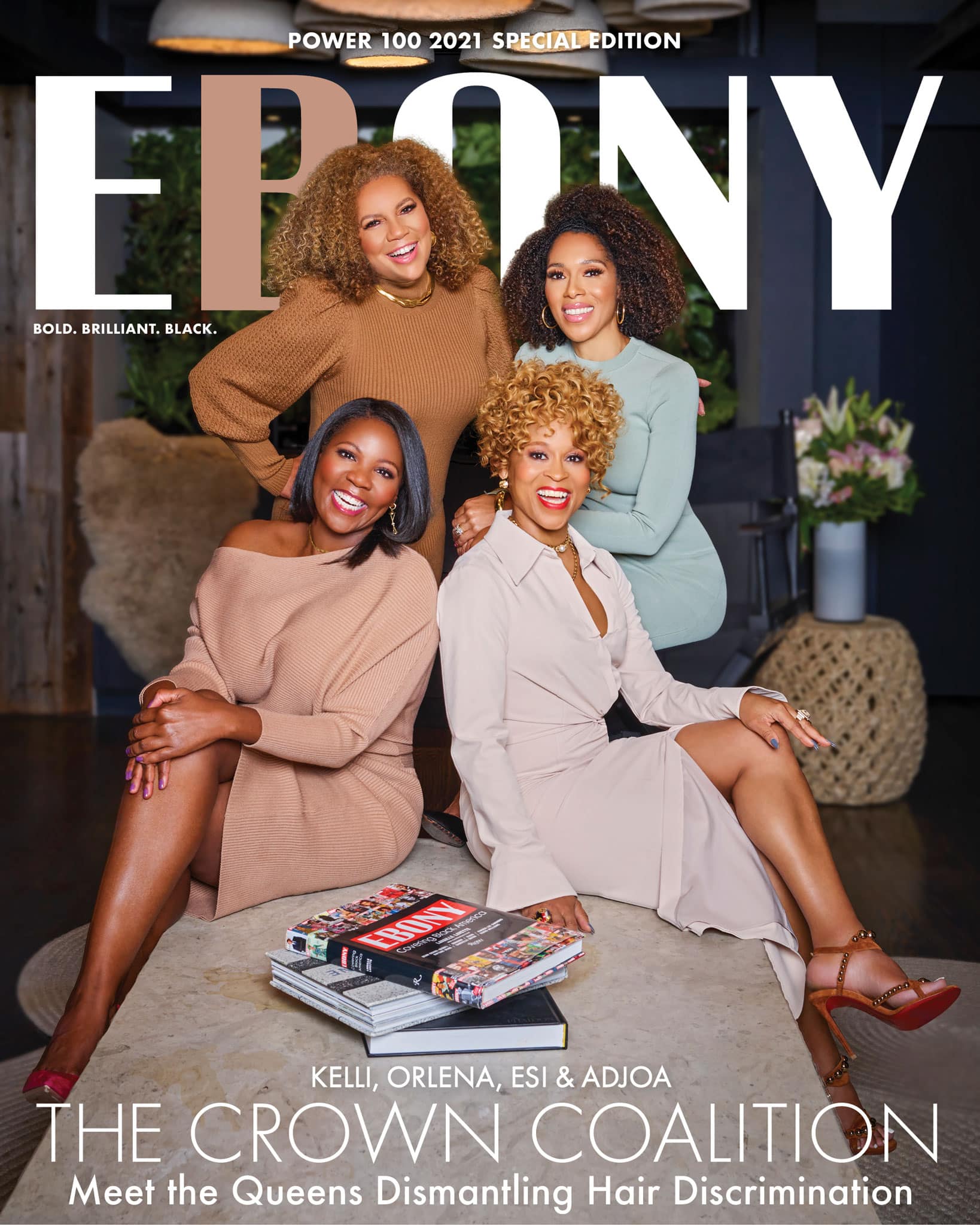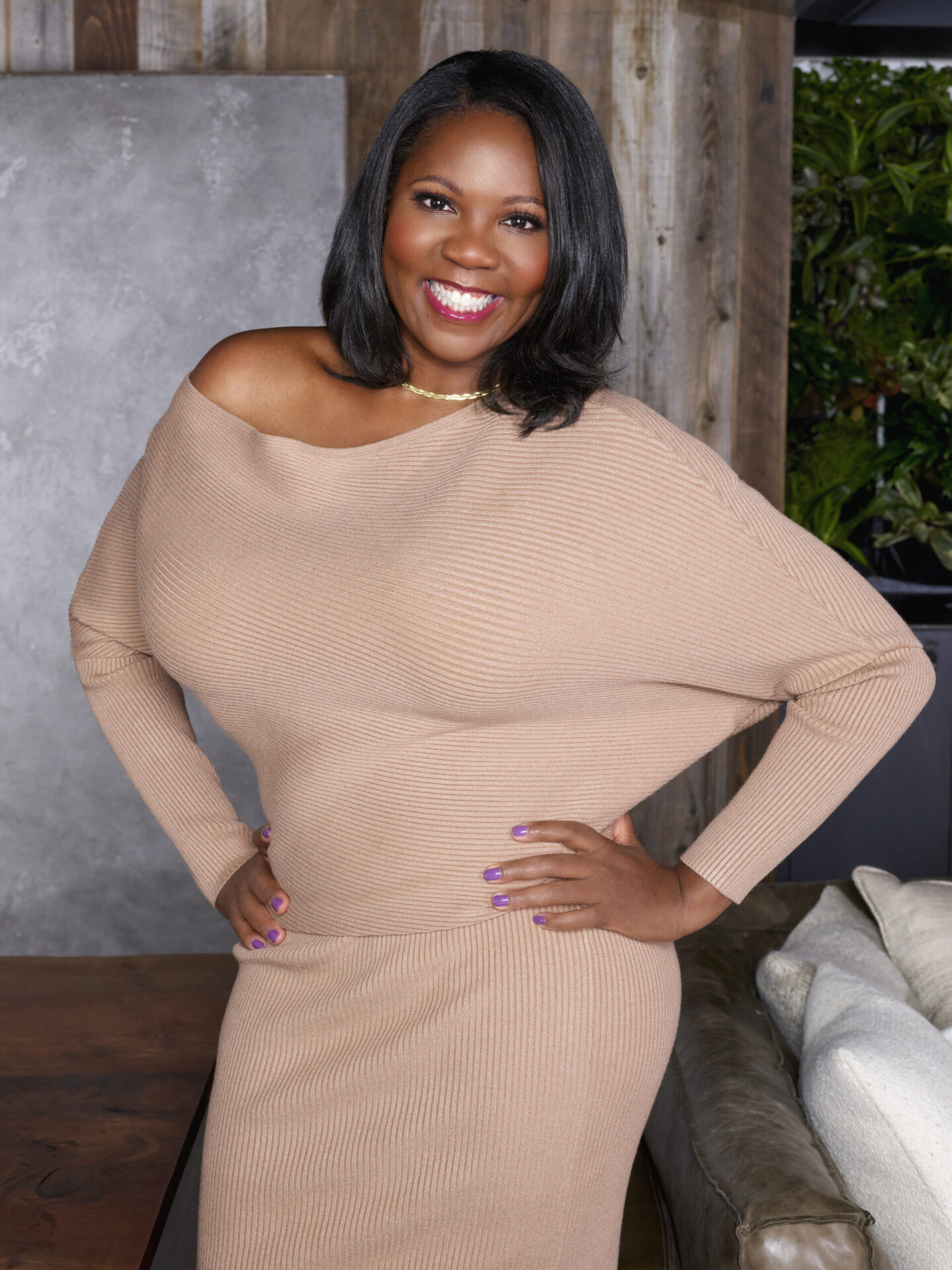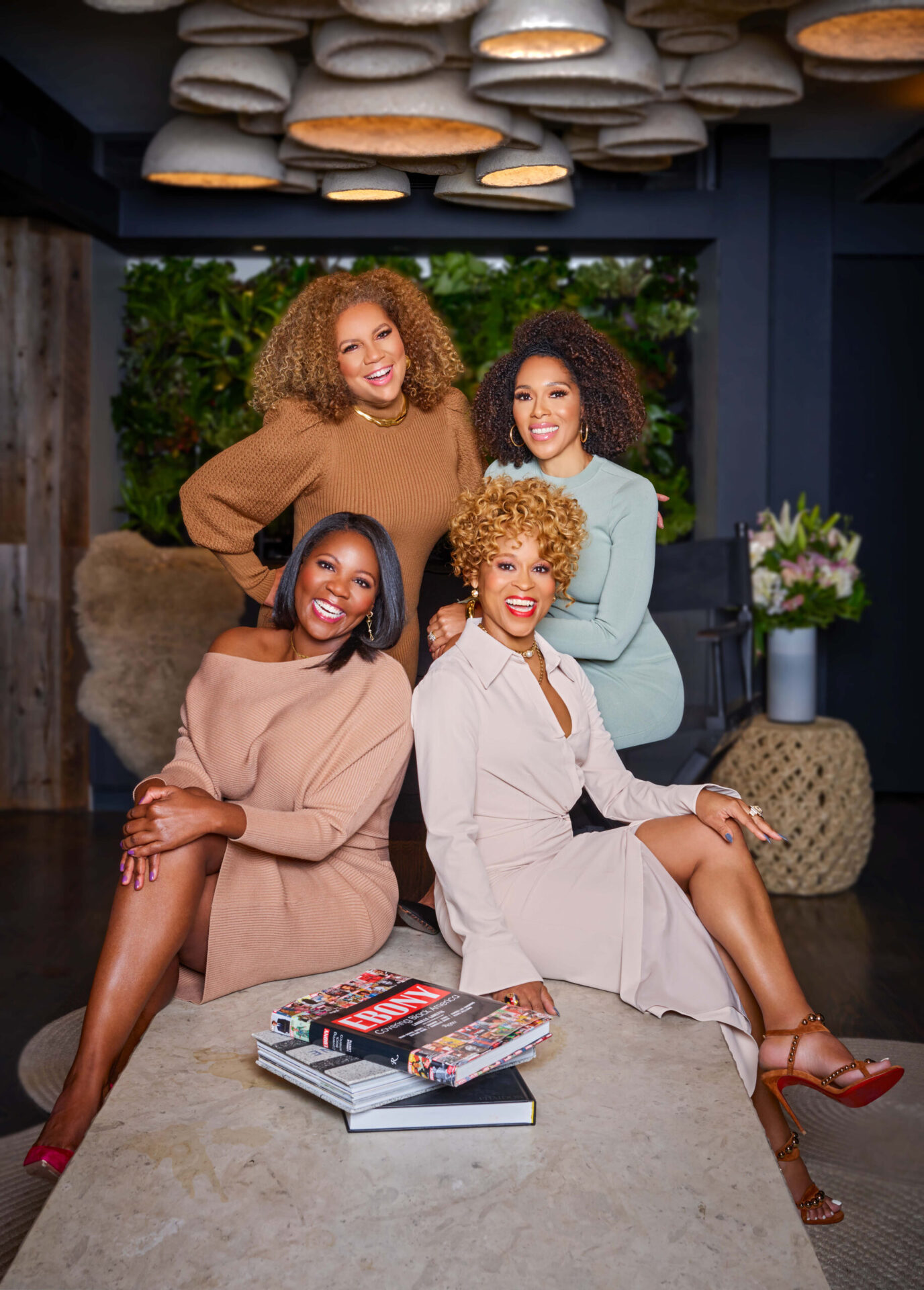
CROWNING GLORY
Meet the co-creators of the CROWN Coalition, who are helping to fight hair discrimination and effecting the kind of change that’ll allow Black Americans to authentically be themselves in the workplace and beyond.
Photographed By Keith Major
At 1 Hotel Brooklyn Bridge Riverhouse
Story By Khalea Underwood
When I was 18, I applied for a hostess gig at a local bar in my small town of Hiram, Ga. I swung by the restaurant to drop off my job application, hoping to make a strong impression. As the general manager reviewed my résumé, he gazed up at my mid-length 4C Afro, freshly washed and set with perm rods the night before. “Are you going to be able to do anything with that?” he asked, gesturing toward my hair. Baffled, I assured him that my coils would be tucked away in a protective style if need be. I left the restaurant knowing that I didn’t get the job, and was deeply shamed by the exchange.
This was in 2009. Instances like mine—clear discrimination based on a centuries-old beauty standard rooted in anti-Blackness—have happened long before and after that, and are why the CROWN Act, led by the CROWN Coalition, exists now. First introduced in 2019, the CROWN Act—which stands for Creating a Respectful and Open World for Natural Hair—is a law that prohibits race-based discrimination against natural hair in the workplace and in public schools.
In January 2019, Holly J. Mitchell, a California state senator at the time, first introduced the bill. It was signed into law by Governor Gavin Newsom the following July. And in December of that year, Senator Cory Booker of New Jersey unveiled the bill to Congress, and U.S. Representative Cedric Richmond introduced companion legislation in the House. Currently, the CROWN Act is law in 14 states and 32 municipalities. “It’s my biggest hope for this to become federal law,” says Mitchell, who is now a Los Angeles County supervisor. “Part of this state-by-state strategy also builds momentum to help Congress figure out that they better get with the program—or get left behind.”
The CROWN Act is one that should prohibit experiences like mine. Or like that of Chastity Jones, an Alabama woman who lost a job offer in 2010 because she refused to cut her locs to adhere to company policy. Or like that of Destiny Tompkins, a former Banana Republic employee who was told in 2017 by her manager that her box braids were “too urban.”

Reed Krakoff necklace and shoes.
According to Dove’s CROWN Research Study, Black women are one and a half times “more likely to be sent home from the workplace because of their hair.” Black women’s hair is 3.4 times more likely to be perceived as unprofessional. And 83 percent of Black women are more likely to report being judged more harshly on their looks than women of other ethnicities.
“This really does impact everybody,” Mitchell continues. “Whether you’re loc’d or braided or are wearing twists right now or not—it impacts you. It’s not about natural hair being better, or being ‘woke.’ It’s about having a choice. Being able to pull back the layers on our own struggles and hair is the true legacy.”
That sense of purpose is the bond that connects Mitchell to Adjoa B. Asamoah, Kelli Richardson Lawson, Orlena Nwokah Blanchard, and Esi Eggleston Bracey, who are the co-creators of the CROWN Coalition.
I reached out to a law firm run by a brother in D.C. He brought in three Black women to write the guidance memorandum, which ultimately became the CROWN Act.
Kelli Richardson Lawson
Founder & CEO, JOY Collective
Co-creator, The CROWN Coalition
The coalition—an alliance originally composed of Dove, the National Urban League, Color Of Change, and the Western Center on Law & Poverty, and now joined by more than 85 community and advocacy organizations—supports the team’s efforts. Each woman’s respective talents, connections, and passion fuel the fire behind the work, which is more meaningful than empty buzzwords or black squares.
“This is not void of strategy,” says Asamoah, founder and CEO of ABA Consulting. “Black women have always been the baddest strategists. We’re certainly not the first people to care about these issues. But it was never not the goal to make this a nationwide effort. It’s what we set out to do.”

to change hearts and minds, you have to make people aware of what actually exists in the world that needs to be changed.
Orlena Nwokah Blanchard
President & COO, JOY Collective
Co-creator, The CROWN Coalition
Building the Team
In the very beginning, one of Kelli Richardson Lawson’s roles was putting the team together, one specifically led by Black and Brown women. “I reached out to a law firm run by a brother here in D.C. He brought in three Black women to write the guidance memorandum, which ultimately became the CROWN Act. Another young lady on our team actually created the CROWN logo,” says Lawson, founder and CEO of JOY Collective, a marketing and PR firm that specializes in brand building.
According to Lawson, this village of incredible Black women put their heart, energy, passion, and brilliance into the endeavor. “Black people see each other and feel each other,” she continues. “We understand each other. We get it. We understand the exhaustion, pain, struggle, and celebrations.”

Altuzarra shoes.
Master Marketing
At the same rate, the co-creators of the coalition acknowledge that they aren’t the first to do the work. “We didn’t wake up one day and say that we are the authors of the movement to normalize Black hair,” adds Orlena Nwokah Blanchard, president and COO of JOY Collective. “There are people in the hair industry [who have been doing the work]. There are legislators like the Congressional Black Caucus, who fought in 2014 and pushed back on the Department of Defense because of hair policies that had a direct impact on Black people. There are so many people who have been pushing this movement for years.” However, according to Blanchard, none have pursued it from a policy and civil rights perspective where they actually pursued legislation.
Once the team determined that they were going to seek a legislative path, “we understood that when you change laws, that doesn’t mean that you change hearts and minds,” Blanchard adds. “It means you provide legal recourse.”
Movement work has been my life’s work. So, for me, this is not new. I have never not done this.
Adjoa B. Asamoah
Founder & CEO, ABA Consulting
Co-creator, The CROWN Coalition

“But to change hearts and minds,” Blanchard continues, “you have to make people aware of what actually exists in the world that needs to be changed. And you have to influence it and encourage people to have a different perspective. As cultural marketers, we use imagery and storytelling to do that.”
For the first year of this work on the CROWN Act movement, Blanchard wrote the majority of the communication that went out herself. “Language matters. Words matter. It has to be crafted and narrated from a lived experience,” she explains. “You cannot have a young, white male brand manager write a social media post or tell a story of what it is to be a Black woman with natural hair. The majority of the advertising, marketing, and communications world doesn’t look like us.”
A Corporate Champion
Esi Eggleston Bracey, COO and executive vice president of beauty and personal care at Unilever, North America, recognized that same truth throughout her career, and especially after joining Dove and Unilever in 2018.
“I thought it was really critical that we invest in the Black community and [explore] the areas of tension that have our beauty [excluded],” Bracey says. “[At Dove], we did this project called What Beauty Looks Like, and it came back to our hair. We talked to all age groups of women, and it was proved back to childhood—feeling of [our] hair not being accepted.”
kids were being turned away from school because they’d show up in their beautiful braids. Some were sent to the principal’s office, or worse, to the nurse’s office as if they had some kind of affliction.
Esi Eggleston Bracey
COO & EVP of Beauty and Personal Care, Unilever, North America
Co-creator, The CROWN Coalition
Bracey adds, “And that was compounded with all these stories we were hearing in the media that summer of kids being turned away from school because they’d show up in their beautiful braids. Some were sent to the principal’s office, or worse, to the nurse’s office as if they had some kind of affliction and [were] told that they had to change their hair in order to stay in school.”
Bracey and her colleagues at Dove were “outraged” at these stories. So to help combat them, they formed the Dove Black Beauty Alliance and gathered women and influencers in the industry to see how they could make a difference. And according to Bracey, the work is nowhere near over.
“I’m super proud that the legislation inspired by the CROWN Act has been passed in 14 states. But I am keenly aware that there are 36 states where it hasn’t passed,” Bracey says. “So many of our Black youth aren’t covered. [We will continue] to champion for each and every state and for national federal legislation so that the CROWN Act can be the way and the law in America. Legislation is a part of the battle, but we’re still changing the culture so that we can create equity for Black Americans. Once we hit federal legislation, we’re also going to have to work on changing the culture so that our hair and our beauty continue to be embraced.”

Part of this state-by-state strategy also builds momentum to help Congress figure out that they better get with the program—or get left behind.
Holly J. Mitchell, Supervisor, 2nd District
County of Los Angeles
Co-creator, The CROWN Coalition

Taking It Personally
The work that the co-creators continue to do is impactful not only because of the strong strategy and support behind it but also because of the story each woman tells about her own natural hair journey and her relationship with beauty.
For Asamoah, the work goes far beyond legislative strategy. “I was raised by a Pan-African father, who’s a retired political science and Africana studies professor. I also have taught Africana studies. I have a degree in Africana studies. My mother was born in [the] Jim Crow South,” she says. “Movement work has been my life’s work. So, for me, this is not new. This work is more than one piece of legislation. It’s a representation of what we can do collectively and how we have to outlaw the things that have hurt Black people. We can’t just wait for people to realize they’ve done us wrong.”
Because, as Blanchard notes, the movement isn’t just about normalizing Black hair. It’s about normalizing Blackness as a whole. “I want everybody to understand that the reason that we’re so focused on the language and imagery is because [we are] telling [a] story about the value of human beings. It just so happens to be the characteristics that make us different, as a community, and as a people who descend from the continent of Africa,” she says. “Those things are visually and aesthetically recognizable. [We must] make sure that we are representing in all places and spaces. That’s the only way we begin to change hearts and minds around what is acceptable, what is normal, and what is beautiful.”
Khalea Underwood (@letsbeKHAlear) is a Brooklyn-based writer and beauty editor.
CREATIVE DIRECTOR RASHIDA MORGAN-BROWN
VIDEO JUSTIN REV. BARNES
VIDEO ASSISTANT TYLER BANKS
STYLIST WOURI VICE
STYLIST ASSISTANT BRANDON McCORD
STYLIST ASSISTANT NICK MATHIS
HAIR STYLIST URSULA STEPHEN FOR DOVE HAIR
HAIR STYLIST MONAE EVERETT
MAKEUP MIMI KAMARA
MAKEUP TARA LAUREN
PHOTOGRAPHY ASSISTANT CESAR REBOLLAR
PHOTOGRAPHY ASSISTANT NAFSI BUBB
EXECUTIVE PRODUCER TRACEY WOODS
ON-SET PRODUCER WENDY CORREA
RETOUCHER DIGITAL 805 RETOUCHING
More from the crown coalition
Press shift question mark to access a list of keyboard shortcuts
Press shift question mark to access a list of keyboard shortcuts
Press shift question mark to access a list of keyboard shortcuts
Press shift question mark to access a list of keyboard shortcuts
A Recap of EBONY’s Crown Act Power Talk
In celebration of EBONY’s 75th anniversary, EBONY’s Power 100 List returned in all its glory at a gala event that was held at the Beverly Hills Hilton in Beverly Hills, California. on October 23rd. Ahead of gala, to delve deeper into the expertise and passions of some of the honorees, EBONY curated “Power Talks, ”a series of in-depth discussions highlighting topics such as innovation, small Black business, identity, Black women as business leaders, and more. Check out EBONY CEO Michele Ghee’s enlightening discussion the co-founders of the Crown Coalition
SUBSCRIBE TO EBONY





